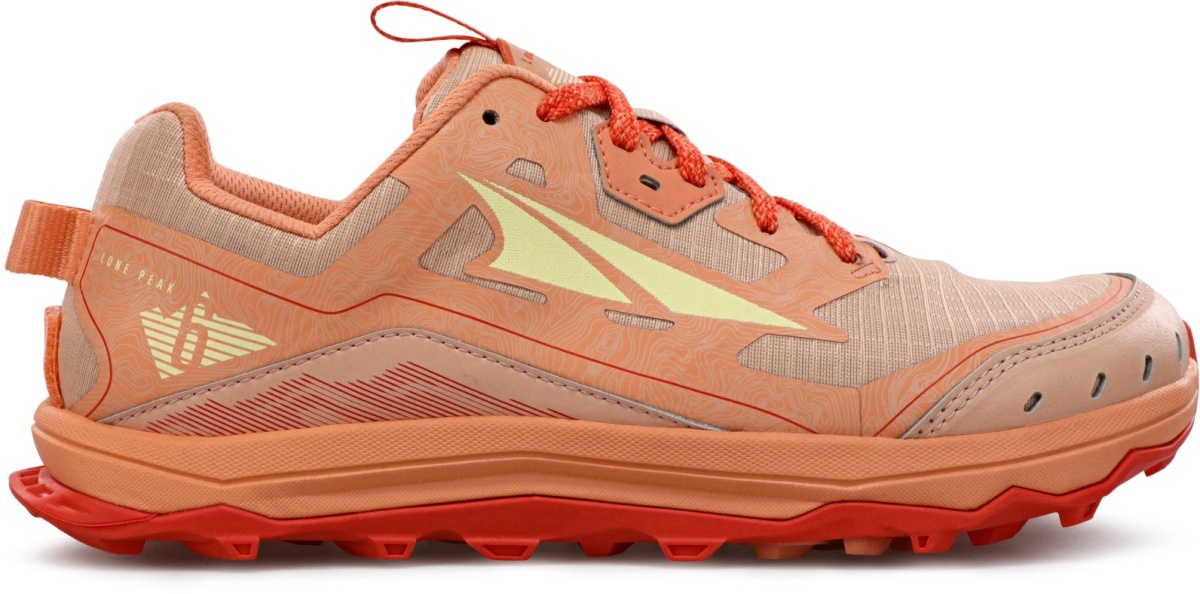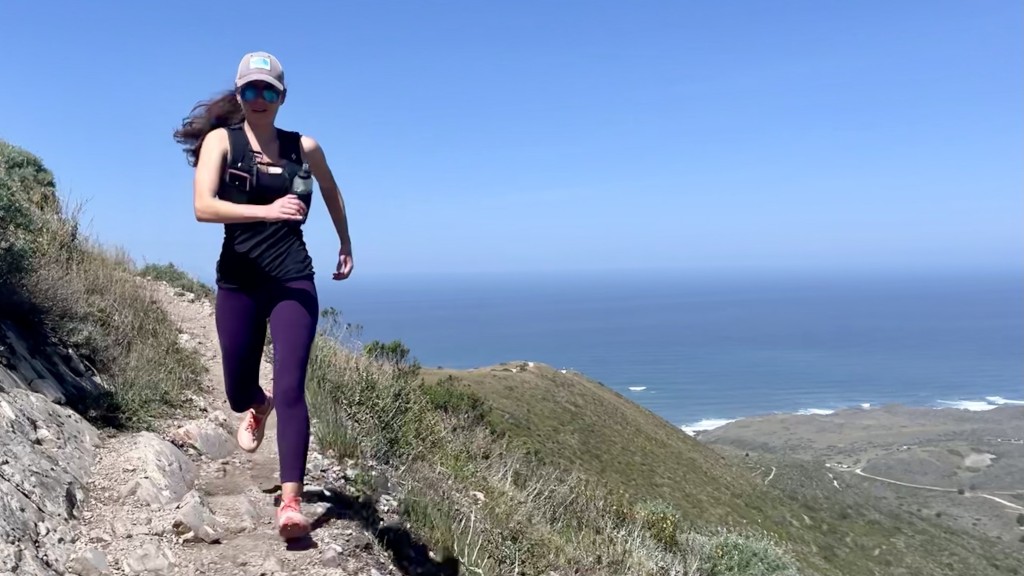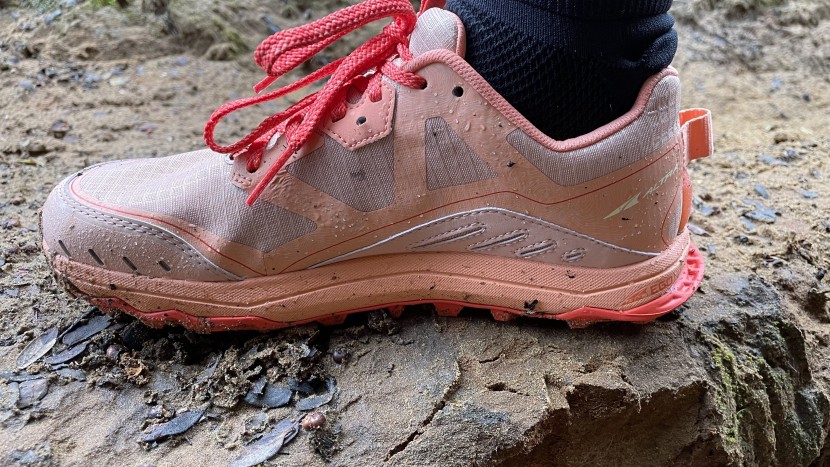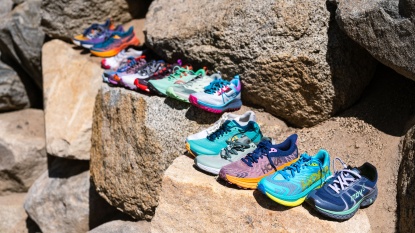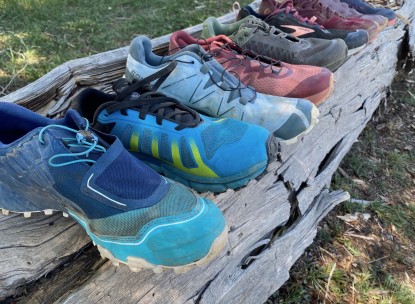Altra Lone Peak 6 - Women's Review
Our Verdict
Our Analysis and Test Results
Altra is known for their foot-shaped, zero-drop shoes that provide ample real estate for toes to splay as you run. The zero-drop design essentially means that the heel and the toe are held on an even level, versus the design of a more traditional running shoe, which uses a differential to lift the heel. With the release of the Lone Peak 6, Altra updated a ton of features that improve the overall wearability and versatility of the shoe. This time around, the changes made were more subtle but ultimately expanded to accommodate a wider range of anatomies.
Foot Protection
The base of the Lone Peak 6 is stacked with 25mm of cushion, which provides plush underfoot cushion — something that we really start to appreciate as mileage mounts. The rock plate and thick heel collar provide lateral protection that comes in handy as you fly over technical terrain.
The Quick-Dry Air Mesh upper serves myriad functions but really shines when it comes to foot protection. Because of how minuscule the mesh holes are, particulate sand and dirt can hardly infiltrate unless you kick it over the heel collar when not wearing gaiters. The toe bumper is softer than many of the other trail running shoes we tested, but we found that it served its toe-protecting purpose. After running miles in shoes with far more rigid and restrictive toe bumpers, we grew to love the softness and comfort of the more pliable toe bumper on the Lone Peak 6.
This version of the Lone Peak comes equipped with its recently-updated drainage system. However, because the drainage holes are condensed at the upper of the toe bumper, we don't find this system to be the most effective after river crossings. However, despite its protective plushness, the upper mesh of the Lone Peak allows the interior to dry fairly quickly, especially when compared to other trail shoes. Whether you want to tackle long-distance runs on rocky terrain or beat these shoes up on a grueling thru-hike, your feet will be comfortable and protected in this version of a zero-drop favorite. The fit is not slender by any means, but it feels pretty svelte when compared to some other zero-drop shoes.
Traction
One of the things we love most about the Lone Peak is that it combines function and comfort in a really balanced way. Unlike some of the other shoes we tested, this one is neither reminiscent of crampons nor cleats, which ups its versatility, general comfort, and cross-over prowess. Standard chevron-shaped lugs are strategically placed beneath the heel and toe beds, but the advent of Trailclaw lugs beneath the metatarsals provides added traction and control. We have tested shoes with far meatier lugs but found the spacing and placement of those on the Lone Peak 6 to be above average in the world of trail shoes.
The MaxTrac outsole adds an extra element of grippiness to help you race over muddy, slippery, or loose terrain. We tested the Lone Peak 6 during a rainy spring and found that it grips decently well on muddy surfaces. The mud shed is adequate, but since we tested this shoe on drizzly coastal bluffs, we had the opportunity to discover that it does not shed loose, wet sand as readily. We reached for these shoes often when looking to tackle fire roads that lead to scree-laden climbs, though they were never our first choice for muddy mountains since shoes with longer lugs generally performed better.
Sensitivity
Time and time again, we found the Lone Peak 6 to be the shoe we reached for when we wanted a smooth ride combined with sensitivity. Because of the zero-drop profile, we felt very connected to the trail during each run we took these kicks on. The low profile and appropriately flexible sole lend themselves well to genuinely feeling the trail beneath your feet, whether you opt to hike or run.
Though the arch support in the Lone Peak is lacking, the midfoot cushion makes up for this in a well-balanced way. We expected the ample cushioning to detract from this shoe's sensitivity but were surprised to discover that it simply muted the intensity of stepping on sharp rocks and sticks. The space provided for optimal toe spreading combined with the rigid yet flexible sole allowed the midsole to evenly distribute the impact of stepping on a rogue rock or other trail feature.
Stability
We tend to look at stability from a few different angles. We take into consideration the stability of the actual shoes we are running in, which includes how susceptible we feel to ankle rolls and how much control we feel we have over the platform of the shoe. But we also think about stability from a biomechanical viewpoint in which we consider the stability and patterns of muscular engagement that each shoe encourages in our bodies.
The low profile, wide footbed, and comfortable side wall all contribute to the stability of the Lone Peak 6. Even though this shoe sits slightly higher, at 25mm, than many other trail runners, the zero-drop construction combined with a perfectly flexible sole help create added stability. The new and improved eyelet pattern across the upper allows for a more customizable fit than in previous models. Utilizing the eyelets to create a snug fit also improves stability since your foot is less likely to slide laterally inside the shoe.
One of the attributes that we love most about zero-drop shoes is the biomechanical stability they can create. Of course, if you are new to running in this style of shoe, it can take some getting used to. However, once your body adapts, you will likely find that zero-drop shoes can lead to more stability within your body as you run. By dropping the heel to be on the same plane as the toes, we encourage more complete use of the rear chain of muscles in our bodies. Additionally, the iconic Altra toebox space allows for our toes to splay as we run, which can lead to strength gains in the small muscles of our feet.
Comfort and Fit
This version of the Lone Peak is one of the most comfortable trail running shoes out there, in our opinion. Not everyone feels that way about zero-drop shoes, so our enthusiasm about the comfort of these shoes should be taken with a grain of salt. But our glowing review of the comfort is more about the structure of the shoe than it is about its level platform. With this in mind, if you plan to spend long, long days on the trail, the underfoot comfort of the Lone Peak might be just what you are looking for.
Unlike many trail running shoes that have rigid, protective elements and less flexible architecture, the Lone Peak doesn't need a lengthy break-in period. Past versions of the Lone Peak have had serious durability issues, but Altra seems to have stepped up their game recently. While the cushioning of both the Lone Peak 5 and 6 get packed out more quickly than other shoes, we haven't seen as many issues with seams blowing out or the edges of the shoes just disintegrating. Since the value of a gear purchase is directly linked to how long it lasts, the updated durability makes these shoes a better value than they used to be. Even though our testing doesn't span as many miles or months as we would like, we go to extreme lengths to put our shoes through the wringer.
Ultimately, the Lone Peak 6 is an exceptionally comfortable choice if you are in the market for a zero-drop trail runner. As previously mentioned, these shoes are favored by thru-hikers and continue to be at the top of the list for hikers who want a lightweight and stable shoe that is less cumbersome than a traditional hiking boot.
This version of the Lone Peak has arguably one of the most customizable fits. In past versions, the wide toebox has walked the line between feeling spacious and clownlike. The Lone Peak 6 has a new eyelet pattern atop the shoe that allows the upper to be cinched to accommodate your unique feet. With a more customizable upper, the plus-sized toebox gives our toes space to spread while still feeling like a secure, well-fitting runner. It is valuable to note that with the release of this version, Altra did away with the option for wide sizing.
The Lone Peak lacks the extreme arch support of some of its competitors, which has the potential to be a huge negative if you seek a structural arch in the foundation of your shoes. The arch support that it does offer is soft enough to be comfortable for a wide variety of foot shapes, adding to this shoe's wide-ranging comfort.
Weight
If you are looking for epic comfort combined with a low weight, this is the shoe for you. This time around, the Lone Peak boasts one of the lowest weights in our collection of trail runners. When it comes to trail running shoes, we don't typically worry about a few extra ounces of weight since that weight often comes as a result of added protective or functional elements. But if you are looking to shed ounces without much of a sacrifice in other areas, this is a good choice.
Most notably, the Lone Peak offers great ratios. For example, it scored well for foot protection while being relatively lightweight. The same goes for traction; the Lone Peak scored above average in that metric due to its solid lugs and grippy MaxTrac rubber, but without additional weight.
Should You Buy the Altra Lone Peak 6?
The Lone Peak 6 is our top choice for zero-drop running or hiking comfort. It has 25mm of plush underfoot cushion, and when paired with its grippy outsole, trail-biting lugs, and updated durability, we can't recommend it enough. Though Altra discontinued their wide option, the added eyelet structure makes it a versatile and comfortable shoe. We recommend the Lone Peak for short and long distances alike, the only caveat being that zero-drop shoes might not suit everyone's musculature.
What Other Trail Running Shoes Should You Consider?
While durability has been an issue with the Lone Peak versions of the past, we are pleased to report that 50+ miles of trail time in, the Lone Peak 6 has yet to degrade in the lugs or outer structure. We continue to notice the cushioning getting packed out a bit more quickly than in other shoes, such as the ultra-durable and rigid Dynafit Feline SL. The Salomon S/Lab Ultra 3 is another shoe that offers a wide toebox, but since it offers less cushioning, it may not appeal to those looking for a plush ride.


